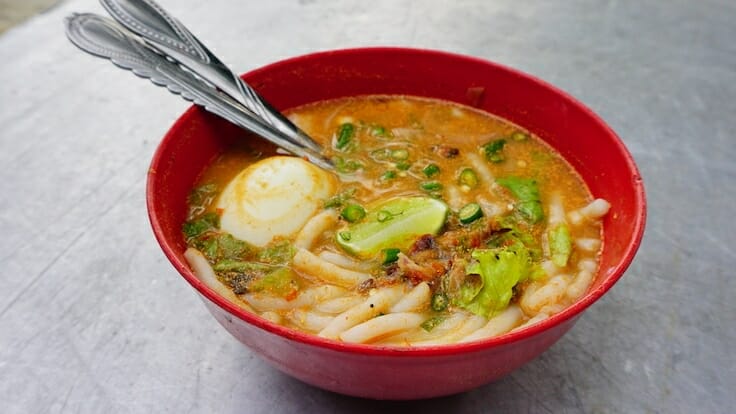
Published by BusinessToday, image by BusinessToday.
Although the Prime Minister cum Finance Minister YAB Dato’ Seri Anwar Ibrahim via Budget 2024 had stressed that “the battle in dealing with the cost of living, which was initiated by the late Datuk Seri Salahuddin Ayub [former Minister of Domestic Trade and Cost of Living/KPDN], shall not end, and will be further enhanced” under the Payung Rahmah programme, food inflation as a category in its own right hasn’t been given much attention.
It’s critical for there to be a closer alignment between cost-of-living (viz., reducing the financial burden of the rakyat) and food inflation (viz., reducing food prices) not only because (it’s a truism that) the latter significantly impacts the former but also to ensure a more holistic and comprehensive policy framework and approach involving the entire supply chain that’ll promote and guarantee sustainable food security understood here as ready availability and accessibility at all times and in all places at affordable prices.
Food inflation should remain a key concern and might go higher (again) due to geopolitical dynamics (directly via supply-chain disruptions and indirectly via cost transmission), the El Nino phenomenon, other climatic conditions resulting from global warming, export restrictions and other protectionist measures, etc. (“Balancing food inflation and subsidy reforms”, Lee Heng Guie, The Star, September 11, 2023).
This is set against the backdrop whereby the economy is still recovering for many households (“Our economy is still recovering’”, The Star, July 29, 2023), i.e., still reeling from the scarring impact of Covid-19 in the form of depleted savings and reduced income (“INTERACTIVE: KL household incomes worst hit by pandemic”, The Star, October 19, 2023).
As it is, persistent food inflation is paired with cashflow problems whereby there’s a positive correlation.
In addition to the overarching Payung Rahmah programme, the Madani unity government via the Minister of Economy YB Rafizi Ramli and his ministry have embarked on and launched the People’s Income Initiative (IPR). Participants now enjoy increased revenue by multiple times (up to RM14000 on average) and RM500 million will be allocated under Budget 2024 “to increase the participation of more hardcore poor”. As it is, IPR revolves around the three components of the supply chain, namely the upstream in the form of the Agro/Farmer Entrepreneur Initiative (Intan), midstream in the form of the Food Entrepreneur Initiative (Insan) as well as Ikhsan in the form of the Service Operator Initiative (downstream).
Like Payung Rahmah, IPR has helped to alleviate the financial burden of the rakyat by providing income generating opportunities and will continue to do so even as both flagship and signature programmes are being expanded under Budget 2024 (and beyond).
However, it’s critical for the Madani unity government as driven by the Madani Economy Framework to also conceptualise how food inflation as a distinct or separate albeit inter-related policy category/issue can assist the cost-of-living measures.
In this, a closer alignment between cost-of-living and food inflation can be epitomised and represented by policy measures undertaken to re-regulate the supply chain involving the nation’s staple, i.e., rice, as a prominent case in point.
Instead of market liberalisation, we should be reverting back to stronger State involvement in the form of the restoration of the National Padi and Rice Board (Lembaga Padi dan Beras Negara/LPN) which was established in 1971 as a statutory body under the Lembaga Padi dan Beras Negara Act. The proposed reversion was indeed a policy idea of the late Salahuddin Ayub himself when he was the Minister of Agriculture and Agro-based Industry.
What better way, thus, to honour his blessed memory.
This is also in line with the recent calls by the Malaysian Padi Farmers Brotherhood Organisation (Pesawah) and non-governmental organisation (NGO) Padi Rescue.
Or Bernas could even be reversed corporatised as a government-linked company (GLC) under the now Ministry of Agriculture and Food Security.
Either way, the State would take full responsibility and control in the single gatekeeping mechanism (SGM) instead of leaving it to Bernas as a private entity where it has to import according to market prices, regardless. This means loss-making when prices exceed the ceiling (selling) prices. Furthermore, Bernas can only import according to market supply. This renders the role of a private entity ineffective during times of crises.
We have seen how only government-to-government (G2G) arrangements can help secure the needed levels of supply flow to complement and supplement the domestic stock in reference to India which has agreed to lift export restrictions to the tune of 170,000 tonnes of non-basmati white rice (“India agrees to sell rice to Malaysia”, The Star, October 20, 2023).
In addition, as a private entity, Bernas’s role is also stymied as the buyer-of-last resort (BOLR) whereby it has no choice but to purchase paddy irrespective of the quality at a guaranteed floor price which is currently set at RM1300 per metric tonne. Although the government provides a subsidy of RM360 per metric tonne which has been increased to RM500 per metric tonne under Budget 2024, there’d be a time-lag since applications would have to be made subject to bureaucratic procedures. This adds to the cashflow pressures of padi farmers who are experiencing higher input costs (seeds, fertilisers, pesticides, machinery rental, land rentals, etc.).
Hence, a government entity would be able to dispense with both the minimum or floor selling price and the subsidies to the padi farmers simultaneously – without payment delays/backlogs – as BOLR (and absorb any financial losses).
From one vulnerable point to another, it means too that Bernas wouldn’t be able to perform the role of stockpiler-of-the-last resort (SOLR) which is critical if we’re to ensure sufficient supply to meet demand or any shortfall.
As SOLR, Bernas should then be able to release excess or surplus stock into the market to relieve supply pressures (nationwide).
This would obviate losses to Bernas (as buyer) and/or downstream players (i.e., retailers) as a result of hoarding and, by extension, re-packaging of labels (i.e., from local to imported) as well as mixing of rice (i.e., local and imported together) by the midstream cartel players.
However, a government entity like the LPN or a GLC equivalent can be better poised to fulfil such a role. This because the institutional vulnerabilities/exposures of Bernas can be redressed with the substitution of a government entity backed by greater financial and non-financial resources in the form of the LPN or GLC equivalent.
The role of LPN – in substituting for Bernas – will be also as SOLR (i.e., as in also seller of the last-resort) for seedlings and fertilisers. This will provide proper competition in the market since the market for the distribution of seedlings and fertilisers are currently subject to oligopoly, i.e., government-approved suppliers.
Should there be reverse corporatisation, funding could also come from private sector sources, i.e., GLC banks, whereby there would be issuance of corporate bonds, including sukuk (that could partly to a certain extent help in what should be the long-term fiscal consolidation and deficit reduction plan rather than under the Medium-Term Fiscal Framework/MTFF, 2023-2025). There could then be a transition to re-investment into equity holdings at the later stage.
In short, the LPN or its GLC equivalent would be able to ensure food inflation for our staple at affordable levels both directly for rice imports, especially during times of crises, and indirectly in correlation/synchronisation with domestic rice by ensuring ample supply as SOLR (to reduce price pressures on the former).
At the same time, as SOLR, an LPN or its GLC equivalent would be in a better position to help in the coordination of the operational activities of the private sector cartel in the distribution of domestic rice supply to ensure that the profit margins are equitably distributed among both the bigger and smaller players which could form a joint-venture (JV) for such purposes (see EMIR Research article, “Budget 2024 – focus on cashflow also”, October 13, 2023).
In the same vein, a government-entity as SOLR would be able to invest in production, milling and warehousing activities alongside vertical integration between upstream and midstream components of the supply chain.
For example, a government entity or its GLC equivalent can venture into padi plantation schemes in Kalimantan which may spillover into or share landbank with the Borneo territories of Sabah and Sarawak, including hill-padi cultivation, by way of a joint-border agricultural area characterised by geographically seamless production networks of padi fields where there can be sharing of irrigation, processing and storage facilities. Other zones would be between Kedah and Kelantan and their regional counterparts in the Deep South of Thailand.
Indeed, we’d positioned then to enter into strategic alliances with both Thailand (who’s ahead of us in rice production and one of the world’s leading exporters) and Indonesia and, by extension, contribute to the ASEAN Food Security Reserve (AFSR) designed to pool stockpiles of rice supply in critical times such as disasters.
The role of LPN will be complemented and supplemented by the existence of a Malaysia Food Security Agency (MFSA) which wasn’t mentioned or alluded to in Budget 2024.
Whilst Budget 2024 has allocated RM400 million for the implementation of the Food Security Strengthening Programme which would, e.g., promote collaboration with state governments in optimising land use to increase crop and livestock production (RM150 million sub-allocation) and RM50 million to supply 50,000 farmers with bioorganic fertilisers to increase soil fertility (see EMIR Research article, “Revolutionising agriculture ― bio-fertilisers from palm oil empty fruit bunches”, January 7, 2021), there’s still a critical need for a MFSA that’ll ensure supply-chain resilience from external sources via import diversification, aggregator and integrator arrangements with overseas farms (non-poultry live stock), G2G agreements on non-rice food produce, bulk/wholesale purchases of animal feed, etc. The MFSA could also play the role of a SOLR for certain food produce and animal feed to complement the role of the pre-existing approved permit (AP) holders.
Part of the funding for the establishment of an MFSA could come from an Inflation Stabilisation Fund which in turn could be partly funded by our foreign exchange (forex) reserves with Bank Negara. This would include the yuan/renminbi (CNY/RMB) obtained via currency swap arrangements with the People’s Bank of China (PBOC) which would be recycled back into importing food produce and feed products from the China and also from countries desiring to obtain the currency as part of its forex diversification (especially BRICS member-states).
A MFSA is expected to have its presence and footprints strategically in certain countries as representing gateways into the respective regions concerned (representative offices) which will allow for direct and specialised negotiations to take place for both trading (importing) in non-USD currencies. This should also include our RM as well as some space for bartering. The supplies for the bartering would come from our, i.e., the MFSA’s, acquisitions and stockpiling of food resources from other countries.
The existence of a MFSA will contribute towards managing and keeping inflationary pressures under control whilst promoting self-sufficiency and food security in the longer term.
In the final analysis, the nationalisation or corporatisation of Bernas as well as the establishment of an MFSA would cushion us from the vagaries and volatilities of market forces and conceptualised as a form of the “(re)deployment” of targeted subsidies on a “macro”-level, i.e., covering the entire supply-chain and in a more effective and sustainable way by harnessing and marshalling non-fiscal resources such as re-regulation of and intervention in the market at the same time to control food inflation.
Jason Loh Seong Wei is Head of Social, Law & Human Rights at EMIR Research, an independent think tank focussed on strategic policy recommendations based on rigorous research.

